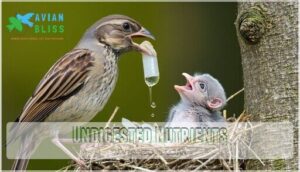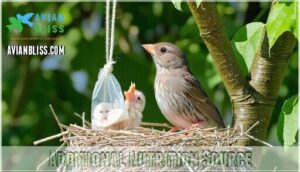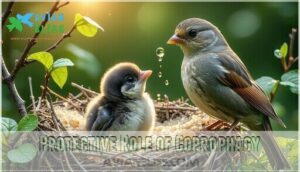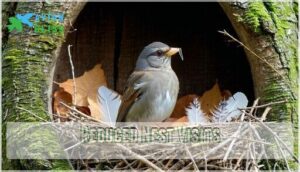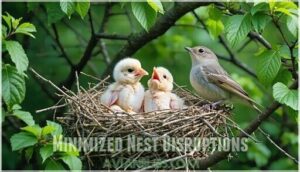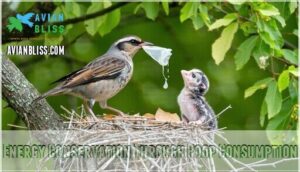This site is supported by our readers. We may earn a commission, at no cost to you, if you purchase through links.
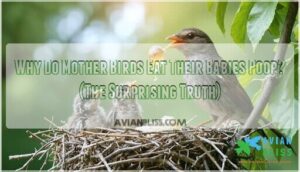
These dedicated parents aren’t just being gross – they’re getting a nutritional bonus while keeping their chicks safe.
Fecal sacs contain up to 30% undigested proteins, fats, and essential nutrients that give exhausted parent birds an energy boost during demanding nesting periods.
But there’s more to this behavior than just recycling calories.
By immediately consuming these waste packets, mother birds eliminate telltale scents that could attract hungry predators to their vulnerable nest.
It’s nature’s version of covering your tracks, ensuring the nest stays both clean and invisible to threats lurking nearby.
Table Of Contents
- Key Takeaways
- Why Do Mother Birds Eat Their Babies Poop?
- Nutritional Benefits of Fecal Sacs
- Protective Role of Coprophagy
- Evolutionary Significance of Poop Eating
- Coprophagy for Nest Cleanliness
- Energy Conservation Through Poop Consumption
- Coprophagy as a Survival Strategy
- Frequently Asked Questions (FAQs)
- Do birds eat baby poop?
- How does a baby bird poop?
- Why do baby birds eat fecal sacs?
- Why is Baby Bird Poop white?
- Do mockingbirds eat their babies poop?
- Why do parents eat baby poop?
- Do all bird species practice coprophagy?
- Can eating fecal sacs harm the mother bird?
- How long do nestlings continue producing fecal sacs?
- Are there any alternatives to coprophagy for nest maintenance?
- Conclusion
Key Takeaways
- You’re witnessing nature’s ultimate recycling program – when mother birds eat their babies’ fecal sacs, they’re reclaiming up to 30% of undigested proteins, fats, and essential nutrients that provide crucial energy during demanding nesting periods.
- You’ll understand this behavior keeps nests invisible to predators – by immediately consuming waste packets, mother birds eliminate telltale scents that could attract hungry predators to their vulnerable chicks’ location.
- You’re seeing a brilliant nest hygiene system in action – this behavior maintains spotless living conditions that prevent dangerous bacteria, parasites, and diseases from threatening developing chicks.
- You’ll realize this strategy maximizes parental efficiency – eating fecal sacs allows mothers to stay close for constant warmth and protection rather than making risky trips away from the nest to dispose of waste.
Why Do Mother Birds Eat Their Babies Poop?
When you spot mother birds eating their babies’ bird poop, you’re witnessing coprophagy—a brilliant survival strategy.
This behavior isn’t gross; it’s genius. Mother birds consume fecal sacs (mucous-covered waste packets) for multiple reasons.
They’re recycling undigested nutrients that support mothers health and energy levels during intensive parental care.
This parental investment keeps nests spotless, reducing disease risks and parasite buildup that could harm vulnerable chicks.
Clean nests also help various bird species avoid predators by eliminating telltale scents.
By eating waste instead of carrying it away, mothers stay close to their young, providing constant warmth and protection.
This efficient nest hygiene system supports healthy chick digestion development while conserving precious energy during the demanding breeding season.
Nutritional Benefits of Fecal Sacs
You’ll be amazed to learn that baby bird poop isn’t just waste—it’s actually packed with valuable nutrients that mother birds can’t afford to waste.
These fecal sacs contain undigested proteins, fats, vitamins, and minerals that provide essential nutrition for hardworking parent birds who need every bit of energy they can get.
Undigested Nutrients
When nestlings eat, their underdeveloped digestive systems can’t extract every bit of nutrition from their meals. Fecal sacs become treasure troves of undigested proteins, fats, and essential amino acids that would otherwise go to waste.
Nature’s ultimate recycling program: baby bird waste becomes premium parental nutrition
Mother birds capitalize on this nutrient reclamation opportunity, basically getting a nutritional bonus from what seems like refuse. Birds benefit from this behavior, as it can modify their gut biota, enabling nutrient absorption.
Here’s what makes baby bird poop so valuable:
- High protein content – Up to 30% of calories remain available in early-stage nestling waste
- Essential fats and amino acids – Critical building blocks for maternal health during demanding nesting periods
- Beneficial gut microbiome – Probiotics that support digestive health and energy recycling
This chick digestion inefficiency becomes the parent’s gain. As nestlings mature and their digestive systems improve, the nutritional payoff decreases, which explains why parental care behaviors shift from consuming fecal sacs to simply removing them for nest hygiene.
Additional Nutrition Source
Recycled nutrients from fecal sacs offer mother birds a critical nutritional boost during demanding chick-rearing periods.
These nutrient-packed droppings contain undigested proteins, fats, vitamins, and trace elements that support maternal health when energy demands peak.
Female birds, especially nutritionally stressed from egg production, consume more fecal sacs than males to recover essential resources.
This bird nutrition strategy helps parents maintain energy levels while constantly feeding their brood.
The gut microbiome benefits from beneficial bacteria in nestling waste, improving digestive efficiency.
For species producing crop milk, these recycled nutrients enhance milk quality, directly supporting chick growth and development.
Here’s what makes fecal sacs nutritionally valuable:
- High protein and fat content from inefficient nestling digestion provides immediate energy
- Beneficial gut bacteria improve parental digestive health and nutrient absorption
- Antioxidants and vitamins support immune function during physically demanding breeding seasons
This remarkable adaptation turns waste into a valuable nutritional supplement for hardworking parents.
The behavior of eating feces, also known as bird coprophagy, is still not fully understood and requires further research to uncover its benefits and implications.
Protective Role of Coprophagy
You’ll be amazed at how coprophagy acts as nature’s security system for bird families.
When mother birds consume their chicks’ droppings, they’re eliminating telltale scents that could attract predators while maintaining a spotless nest environment that prevents harmful bacteria from threatening their vulnerable babies.
Predator Deterrence
Beyond the obvious hygiene benefits, scent masking serves as nature’s invisibility cloak for vulnerable chicks.
When you observe avian behavior, you’ll notice mother birds consuming fecal sacs to eliminate odor compounds that could attract mammalian predators.
This predator deterrence strategy works like erasing fingerprints at a crime scene—reduced detection means safer nests.
Sac disposal through consumption prevents olfactory trails that lead predators straight to nestlings.
Parental vigilance includes this camouflage nests technique, where mothers literally eat the evidence to protect their young from discovery.
Nest Hygiene
Mother birds’ nest-cleaning habits involve consuming their babies’ waste as part of a thorough sanitation strategy.
By eating fecal sacs, these dedicated parents maintain sterile living conditions that protect their vulnerable chicks from dangerous pathogens and parasites.
This waste removal system works like nature’s ultimate cleaning service, with mother birds consuming waste within seconds of production.
The fecal sacs’ mucous membrane provides bacteria control, creating a protective barrier that prevents contamination during consumption.
Here’s what makes nest sanitation so effective:
- Immediate odor management eliminates scents that attract predators to the nest site
- Parasite reduction prevents harmful organisms from establishing colonies in bird waste
- Continuous nest cleanliness maintains healthy environments without constant trips away from chicks
This behavior demonstrates remarkable efficiency in nest sanitation.
To prevent disease, daily cage cleaning is also vital for pet bird owners.
Some species handle up to 150 fecal sacs daily, ensuring their babies develop in pristine conditions that maximize survival chances.
Evolutionary Significance of Poop Eating
You’ll discover that this behavior isn’t just gross—it’s actually a brilliant evolutionary strategy that’s been fine-tuned over millions of years.
Mother birds developed this instinct because it gives their chicks the best possible chance of surviving to adulthood in a dangerous world.
Natural Behavior
You’ll find that instinctual coprophagy represents millions of years of evolutionary refinement in avian parenting. This natural behavior emerges automatically when parent birds encounter fecal sacs, demonstrating how evolutionary drivers have shaped effective waste management strategies.
Parental investment in nest cleanliness through coprophagy isn’t learned—it’s hardwired into avian behavior. Parents respond instinctively to visual and tactile cues from nestlings, making this bird parenting strategy as natural as feeding.
| Behavior Aspect | Timing | Evolutionary Benefit |
|---|---|---|
| Fecal sac consumption | Immediate after production | Energy conservation |
| Nest cleaning | Throughout nestling period | Predator avoidance |
| Behavioral cessation | As chicks mature | Resource allocation |
This instinctual response showcases nature’s efficiency—no training required, just pure evolutionary programming that’s kept bird families thriving for millennia.
Chick Health Maintenance
You’ve learned this behavior comes naturally to birds, but there’s more to the story.
When mother birds consume fecal sacs, they’re actively protecting their babies’ health.
These mucous-covered packages contain harmful bacteria that could spread disease prevention throughout the nest.
Waste removal through coprophagy creates a sterile environment where chicks can develop safely.
The mother’s hygiene promotion efforts directly support chick health by preventing bacterial infections that could weaken or kill vulnerable nestlings.
This bird sanitation system also supports gut health in growing birds.
Nest cleanliness isn’t just about appearances—it’s about survival.
Without proper disease prevention, entire broods could succumb to infections.
This growth support mechanism guarantees chicks reach maturity in a clean, healthy environment.
Coprophagy for Nest Cleanliness
You’ll notice that mother birds constantly eat their chicks’ fecal sacs to keep their nests spotless and reduce the number of trips away from vulnerable babies.
This clever behavior lets them stay close to provide warmth and protection while maintaining a hygienic environment that won’t attract predators or harbor disease-causing bacteria, which is crucial for the survival of their young.
Reduced Nest Visits
Several factors make consuming fecal sacs a smart strategy for reducing Predation Risk and Weather Exposure. Mother birds can’t afford lengthy Parental Absence periods when chicks face peak Chick Vulnerability.
Each trip away from the bird nest for waste removal creates dangerous windows where predators might strike or harsh weather could harm defenseless babies. By eating waste directly, parents achieve Minimal Disturbance to their protective routine.
This bird behavior eliminates risky flights to disposal sites, keeping mothers close during critical development periods. You’ll notice this efficiency especially benefits species nesting in exposed locations where every moment away increases danger.
It’s nature’s version of working smarter, not harder—turning necessary cleanup into an opportunity to stay put and maintain constant vigilance over vulnerable offspring. To further guarantee a sanitary environment, some bird enthusiasts utilize specialized nest products.
Minimized Nest Disruptions
Beyond fewer cleaning trips, bird chicks benefit from minimized nest disruptions when parents consume fecal sacs. This clever approach keeps the family unit stable during critical growth periods.
When you observe avian parenting, you’ll notice parents create uninterrupted care routines that protect vulnerable chicks. Here’s how consuming fecal sacs helps maintain chick security:
- Constant warmth stays in the bird nest without frequent departures
- Vigilant protection continues unbroken during feeding cycles
- Reduced exposure to weather and predators occurs naturally
- Nesting cleanliness happens without disturbing sleeping chicks
- Energy conservation allows more focused care delivery
This waste management strategy guarantees bird chicks receive consistent attention during their most vulnerable weeks. Parents can focus entirely on feeding and brooding rather than making repeated cleanup flights. Consider using a bird watching camera to observe this behavior closely. It’s nature’s way of keeping the home fires burning while maintaining spotless conditions.
Energy Conservation Through Poop Consumption
Beyond keeping nests tidy, mother birds achieve remarkable metabolic efficiency through consuming fecal sacs. This resource optimization strategy reduces foraging reduction needs by up to 30% during peak nesting periods.
| Energy Benefit | Impact on Parents |
|---|---|
| Reduced foraging trips | More time for chick provisioning |
| Nutrient recovery | Enhanced parental investment capacity |
| Lower energy expenditure | Improved survival rates |
Bird offspring produce waste containing undigested proteins, carbohydrates, and essential minerals. When parents consume these nutrient-rich packages, they’re basically getting a "refund" on their feeding investments.
This energy conservation approach proves especially valuable during harsh weather or food shortages. Observing parrot poop color can also provide insights into their diet and health.
Avian parenting demands constant energy output. By recycling nutrients through coprophagy, parents can maintain their strength while providing continuous care—nature’s version of eating leftovers to save money and time.
Coprophagy as a Survival Strategy
You’ll find that coprophagy isn’t just about nutrition—it’s actually a critical survival strategy that can mean the difference between life and death for bird families.
This behavior substantially boosts chick survival rates while helping parents avoid the deadly attention of nest predators who might otherwise detect their vulnerable babies, which is a matter of life and death.
Enhanced Chick Survival Chances
When mother birds consume their offspring’s waste, they’re basically running a life-saving operation that dramatically improves chick survival rates.
This strategic parental investment creates a protective bubble around vulnerable nestlings through three key mechanisms:
- Disease Prevention: Removing fecal sacs eliminates bacterial breeding grounds that could sicken developing chicks
- Reduced Parasites: Waste removal prevents parasite infestations that weaken growing birds
- Thermal Regulation: Clean nests maintain proper temperature control for ideal chick development
Through diligent hygiene and waste removal, avian parenting transforms potentially deadly nest conditions into safe havens where offspring can thrive.
Effective parasite control methods are vital for maintaining healthy chickens and preventing the spread of diseases.
Nest Predator Avoidance
When predators hunt for vulnerable nestlings, they rely heavily on visual and scent cues to locate nests.
By consuming fecal sacs immediately after chicks defecate, mother birds eliminate these telltale signs that could spell disaster for their young.
This predator deterrence strategy works because fecal odor can travel considerable distances, creating invisible trails that lead bird predators straight to hidden nests.
Nest camouflage becomes far more effective when there’s no waste to give away the location.
Studies show that nests with visible fecal sacs experience higher predation rates, particularly from corvids and other visually-oriented hunters.
Through this nest predator avoidance behavior, parents substantially boost their offspring’s survival chances.
It’s nature’s version of covering your tracks—literally.
This nest security measure proves that sometimes the best defense is simply removing the evidence that you’re there.
Frequently Asked Questions (FAQs)
Do birds eat baby poop?
Yes, parent birds eat baby poop regularly. You’ll find they consume fecal sacs to recycle nutrients, maintain nest cleanliness, and avoid attracting predators with waste odors.
How does a baby bird poop?
Baby birds produce waste in special membrane-bound packages called fecal sacs.
You’ll notice these white, mucous-covered pouches contain their droppings, making cleanup easier for busy parents who either eat or remove them from the nest.
Why do baby birds eat fecal sacs?
Actually, baby birds don’t eat fecal sacs – they produce them.
You’ll find that nestlings create these mucous-wrapped waste packages that parents either consume for nutrients or remove to maintain nest cleanliness and avoid attracting predators.
Why is Baby Bird Poop white?
White’s nature’s diaper design! You’ll notice baby bird poop appears white because it contains uric acid instead of urea, helping chicks conserve water while efficiently eliminating nitrogen waste.
Do mockingbirds eat their babies poop?
Mockingbirds definitely eat their chicks’ fecal sacs to keep nests clean and recycle undigested nutrients.
You’ll see this behavior most when chicks are young and less efficient at processing food completely, which can be considered a complete concept related to their development.
Why do parents eat baby poop?
Like nature’s recycling program, parent birds eat their babies’ fecal sacs to reclaim undigested nutrients and vitamins.
You’ll find this behavior keeps nests clean while providing essential energy for continued chick care.
Do all bird species practice coprophagy?
Not all bird species practice coprophagy. You’ll find this behavior mainly in altricial birds—those whose chicks hatch helpless and need extended nest care, like robins and bluebirds.
Can eating fecal sacs harm the mother bird?
Mother birds face absolutely zero danger when they’re chomping down on those nutrient-packed fecal sacs.
The protective mucous membrane actually shields them from harmful bacteria, making this gross-but-smart behavior perfectly safe.
How long do nestlings continue producing fecal sacs?
Nestlings typically produce fecal sacs until they’re ready to leave the nest, usually around 12-18 days old depending on the species.
You’ll notice production stops when chicks develop enough control to defecate normally.
Are there any alternatives to coprophagy for nest maintenance?
Beyond this Stone Age practice, you’ve got several modern alternatives.
Parents can physically remove fecal sacs by carrying them away from the nest, dropping them in water or distant locations to maintain cleanliness and avoid predators.
Conclusion
Ironically, what seems like disgusting parenting actually represents one of nature’s most efficient survival strategies.
Understanding why mother birds eat their babies’ poop reveals how evolution perfects even the grossest behaviors.
You’ve learned that coprophagy serves multiple critical functions – providing essential nutrition during energy-demanding nesting periods, eliminating predator-attracting scents, and maintaining pristine nest conditions.
This remarkable adaptation transforms waste into survival advantage, proving that nature wastes nothing in its relentless pursuit of reproductive success.
- https://en.wikipedia.org/wiki/Fecal_sac
- https://www.reddit.com/r/NatureIsFuckingLit/comments/y8qk3r/fecal_bags_in_some_nesting_birds_make_it_easier/
- https://digitalcommons.georgiasouthern.edu/context/etd/article/2526/viewcontent/ABurnsFinalThesis.pdf
- https://www.youtube.com/shorts/MRWwPeBBd4s
- https://pmc.ncbi.nlm.nih.gov/articles/PMC8598993/

